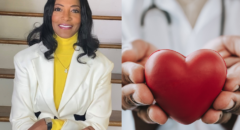
When Bre Khounphinith first began experiencing overwhelming fatigue as a child, her doctors assumed the culprit was asthma. She often found herself out of breath, needing extra rest, and struggling with daily activities. But what seemed like a common respiratory issue was actually something far more serious—an undiagnosed congenital heart condition known as an atrial septal defect (ASD).
Khounphinith’s journey is a testament to resilience, faith, and the power of advocacy. From experiencing multiple misdiagnoses to suffering cardiac arrest just six months after giving birth, she has transformed her experience into a mission to educate and inspire other women—particularly Black women, who are at higher risk for heart disease.
A Lifetime of Overlooked Symptoms
Growing up, Khounphinith was constantly fatigued, but doctors brushed it off as asthma, given how similar the symptoms can be. Because comprehensive heart screenings were less common at the time, no one thought to check for an underlying heart defect.
It wasn’t until she was 20 years old, after collapsing while cheering at a college football game, that she learned the truth.
“When I was 20, I was a cheerleader in college. After every game, I would be so tired that I would literally pass out or blackout. One time, it happened when I was home with my roommate. He called 911, and at the hospital, the doctors asked me if I knew that I had a hole in the middle of the two upper chambers of my heart. I had no idea,” Khounphinith recalls.
The hole between the two upper chambers of her heart was the defining characteristic of an ASD. This congenital heart defect had been affecting her circulation and oxygen levels for her entire life, and yet she had no idea it was even there.
She was prescribed beta blockers and advised to see a cardiologist regularly. She followed the medical advice given to her, but nothing could prepare her for what would happen next.
RELATED: Rising Above: A Mom’s Journey to Beat Postpartum Hypertension

A Pregnancy That Changed Everything
At 25 years old, Khounphinith became pregnant with her son. Like many expecting mothers, she experienced morning sickness and fatigue, but nothing out of the ordinary. However, at seven months pregnant, a specialist shocked her with a warning.
“As soon as he saw me, he said, ‘Who told you to have a baby? This baby is going to kill you.’ I was devastated,” Khounphinith tells BlackDoctor.org.
She had never experienced serious heart complications during her pregnancy, and yet she was now being told that her life was at risk. Despite the terrifying prognosis, she delivered her baby vaginally without medication under close supervision, and her heart remained stable.
However, the real battle was just beginning.
Surviving Cardiac Arrest
Six months after giving birth, Khounphinith’s body gave out. While walking up the stairs, her heart stopped beating. She collapsed in full cardiac arrest.
“Normally, I would be home alone, but that day, my husband and my mother happened to be there. They called 911, and the paramedics walked my husband through CPR. He kept chest compressions going until they arrived. They had to shock me back with an AED. I coded again in the ambulance and once more at the hospital,” Khounphinith shares.
Khounphinith was placed on life support, and her family was told there was no hope—that if she survived, she would likely have severe brain damage. She was one of the first patients in Nevada to undergo post-cardiac hypothermia therapy, a procedure designed to prevent further brain damage.
Miraculously, she woke up three days later.
“My mother hadn’t left my side, but the one time she went home to shower, I woke up and called her. She was in shock! I remembered I had a little boy, but much of my memory was fuzzy,” Khounphinith says.
Though her recovery was long and challenging, Khounphinith gradually regained her strength. She experienced temporary weakness in her hands and suffered a minor heart attack six months later.
“Two years ago, I had a pericardial effusion, where my heart was enlarged, and there was fluid around my lungs. I was hospitalized and had to undergo lung therapy,” Khounphinith adds.
However, Khounphinith never let these setbacks define her.
RELATED: Heart Attack Survivor’s Second Chance at Life: “Listen to Your Body”
Turning Pain into Purpose
Today, Khounphinith is thriving. She has transformed her experience into a mission—educating women about the warning signs of heart disease and encouraging them to advocate for their own health.
As a celebrity makeup artist, Khounphinith realized that the platform she built in the beauty industry could be used for something greater.
“I speak at events, educating women on the signs of heart disease. As women, we often dismiss fatigue or pain as just doing too much, but I tell women: if something feels off, go get checked! I also use my social media to advocate for heart health outside of speaking engagements. I never questioned why this happened to me because I believe there was a purpose behind it. My purpose is to be a heart health advocate,” she says.

A Focus on Holistic Wellness
Khounphinith has also made significant lifestyle changes to manage her condition and prioritize her well-being:
- She has been a pescatarian for seven years and eliminated red meat over a decade ago.
- She exercises every morning to keep her heart strong.
- She practices meditation and prayer to maintain a sense of balance and peace.
- She takes a mix of prescribed medications and natural supplements to support her heart health.
“For me, it’s all about balance—balancing my work life, home life, and self-care. Self-care isn’t just massages and facials; it’s maintaining a healthy diet, exercising, meditating, and planning. When I first started my career, I was traveling non-stop, which took a toll on my body. Now, I prioritize my health because if I don’t take care of myself, I can’t take care of my family,” Khounphinith adds.
A Powerful Partnership with Go Red for Women
One of Khounphinith’s biggest milestones in her advocacy journey was being selected to be a part of the American Heart Association’s Go Red for Women initiative. This program unites women affected by heart disease and empowers them to raise awareness in their communities.
“I’ve been advocating for heart health on my own for so long, so having the AHA and Go Red movement behind me is incredible. As a Black woman, it’s especially important because many of us think breast cancer is our biggest health threat when it’s actually heart disease. Being part of this initiative allows me to spread awareness, especially around maternal health and heart disease,” Khounphinith notes.
Through Go Red for Women, Khounphinith has found a sisterhood of women who truly understand her journey.
“We talk every day, support each other, and share our cardiology visits. I’ve never felt this close to a group of women who truly understand what I’ve been through,” she adds.
Advice to Women Facing Heart Disease
If there’s one thing Khounphinith wants women to take away from her story, it’s this:
- Take your symptoms seriously. Fatigue, shortness of breath, and dizziness could be signs of a more significant issue. Don’t ignore them.
- Demand proper care. Black women, in particular, are often dismissed or misdiagnosed by doctors. Keep pushing until you get the answers you need.
- Make lifestyle changes. A heart-healthy diet, exercise, and stress management can make all the difference.
- Advocate for yourself and others. Speak up, share your story, and encourage other women to prioritize their heart health.
Looking Ahead: A Future of Impact
Khounphinith’s journey has led her to a new passion: public speaking. She continues to travel, share her story, and inspire women worldwide to take control of their health.
“I love speaking engagements. People tell me I’m a powerful speaker, and I never realized it before. I see myself speaking on a larger scale about heart health. Makeup is still my passion, but I’m embracing this new path as a speaker,” she shares.
Through her work in beauty, wellness, and advocacy, Khounphinith is proving that life after heart disease is not just about survival—it’s about thriving.
“For my health, I want to continue living a balanced, healthy lifestyle because this is not a diet—it’s a lifelong commitment,” Khounphinith concludes.








